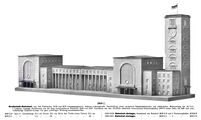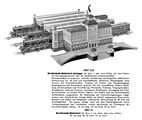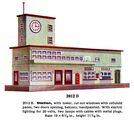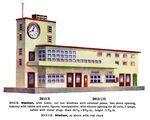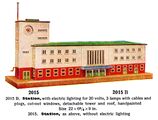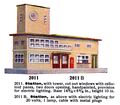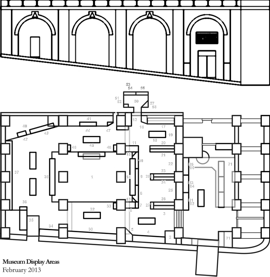Category:Märklin Stations
Although many of Märklin's model railway stations were necessarily fairly generic, there were a small number of standout flagship stations in the range that were quite obviously modelled after some of the most distinctive stations of the time.
Stuttgart Station
1936: The full Märklin 2039 G Stuttgart Station [image info]
The Märklin model of Stuttgart Station was surprisingly accurate, resulting in a monster of a model that was so large, expensive, and frankly so intimidating that Märklin broke the model into two pieces, so that one could buy the station in instalments (or settle for a large representative chunk of freestanding station).
The left-hand part of the station complex was sold as number 2038, the larger right-hand part with the tower was number 2039, and if one wanted to buy both together, the full thing was 2039 G
Leipzig Hauptbahnhof – Leipzig Main Station
1931: Leipzig Station Complex, Märklin 2037 GB [image info]
The massive Leipzig Hauptbahnhof complex was built between 1909 and 1915 to a design by William Lossow (1852–1914) and Max Hans Kühne (1874–1942). Even today, it's still reckoned to be the largest railway station in the world, judged by floor area.
At a time when most national railways were still composed of independent railway companies who would each build their own railway termini in a city, without worrying too much about how passengers would move between them (London's multiple termini won't be properly connected until the completion of the Crossrail project), Leipzig's council took the forward-looking step of preempting the future merging of the railways by building a single combined terminus for both Royal Saxon State Railways and Prussian state railways. This led to Leipzig Station's "double-header" design, with the front of the station in effect being a pair of twin station buildings side by side, fused together, each with their own central grand entrance.
The Märklin models inspired by the station were essentially based on one half of the combined station complex.
Marklin produced three main variants (some of which had gauge 0 and gauge 1 versions: a version with a central towerlike block flanked by two "wing" sections, on a base that extended out from the walls on all four sides (2035): a less literal "towerless" version with a continuous roof (2034), and a "deluxe" version (as in the museum) with a brown built-up ground floor, ramps, steps and fountains/trees (2037).
The larger, "full-on" 2037 version disappeared from the catalogue by 1938, replaced by the massive "2038 + 2039" "Stuttgart" station.
Bahnhof Friedrichshafen Hafen – Friedrichshafen Port Station
1936: Catalogue image of Märklin 2015, Friedrichshafen Port Station [image info]
The original railway station at Friedrichshafen was an important part of Germany's early railway network, and the station was rebuilt in the very later 1920s or early 1930s to a starkly modern design by Karl Hagenmayer, with an instantly recognisable and uncompromising rectangular clock tower.
The station's simple lines and high recognition factor (even when highly simplified) made the station a favourite with Märklin and their customers, with at least four different main models based on the building, one variant (2013 UB) even having a working clock.
A variant on the model, without the clock tower, was sold as number 2014.
The building is still in use, and now houses the Friedrichshafen Zeppelin Museum.
- Google Maps satellite view (google.co.uk/maps)
- Google Streetview (google.co.uk/maps)
- Friedrichshafen (wikitravel.org)
Pages in category ‘Märklin Stations’
The following 3 pages are in this category, out of 3 total.
Media in category ‘Märklin Stations’
The following 19 files are in this category, out of 19 total.
- Friedrichshafen Port Station, Märklin 2011 (MarklinCat 1936).jpg 1,787 × 1,561; 440 KB
- Friedrichshafen Port Station, Märklin 2012 (MarklinCat 1936).jpg 2,295 × 2,060; 661 KB
- Friedrichshafen Port Station, Märklin 2015 (MarklinCat 1936).jpg 2,202 × 1,673; 491 KB
- Friedrichshafen Port Station, Märklin 2013-B B 2013-UB (MarklinCat 1936).jpg 3,037 × 2,431; 982 KB
- Großstadt-Bahnhof - City Station, Märklin 2034 (MarklinCat 1931).jpg 2,324 × 1,951; 1.33 MB
- Großstadt-Bahnhof - Leipzig City Station, Märklin 2035 (MarklinCat 1931).jpg 2,905 × 2,084; 1.65 MB
- Gare Monumental - Leipzig Grand Station, Marklin 2036E 2037E (MarklinCatFr ~1921).jpg 3,200 × 1,667; 1.78 MB
- Grand Station, 'Kleiner Leipziger' (Märklin catalogue).jpg 2,950 × 1,413; 598 KB
- Großstadt-Bahnhof - Stuttgart Station, Märklin 2038 (MarklinCat 1931).jpg 1,841 × 1,581; 891 KB
- Stuttgart Station, Märklin 2038 2039 (MarklinCat 1936).jpg 2,467 × 2,600; 855 KB
- Großstadt-Bahnhof - Stuttgart Station, Märklin 2039 (MarklinCat 1931).jpg 2,148 × 2,042; 1.27 MB
- Großstadt-Bahnhof - Stuttgart Station, Märklin 2039-G (MarklinCat 1931).jpg 3,000 × 1,796; 1.57 MB
- Bahnhofhalle - Leipzig Station Canopy, Märklin 2078 (MarklinCat 1931).jpg 3,000 × 1,414; 1.48 MB
- Covered Junction Platform, Märklin 2078-0 (MarklinCRH ~1925).jpg 2,409 × 1,787; 1.29 MB
- Platform view, Leipzig Station, Märklin 2037 (Brighton Toy and Model Museum).jpg 3,000 × 1,729; 3.22 MB



